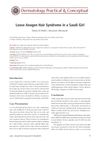 December 2022 in “Journal of Education, Health and Sport”
December 2022 in “Journal of Education, Health and Sport” COVID-19 can cause hair loss, often treated effectively with a combination of supplements and topical treatments.
 January 2014 in “Journal of Pigmentary Disorders”
January 2014 in “Journal of Pigmentary Disorders” Women's hair gets thinner and grayer as they age, with treatments available for hair loss and graying.
July 2022 in “Dermatologica Sinica” Many women with hair loss also have zinc deficiency, iron depletion, or thyroid issues.
January 2022 in “Journal of Ayurveda case reports” Ayurvedic treatment significantly reduced hair loss and improved hair quality in a 30-year-old male.
January 2022 in “Aesthetic surgery journal” Extracellular vesicles may effectively treat hair loss with minimal side effects.
 January 2016 in “Journal of clinical & experimental dermatology research”
January 2016 in “Journal of clinical & experimental dermatology research” New methods can diagnose hair loss by examining the scalp and can treat it with a mix of oral and topical medications, along with cosmetic procedures like hair transplants.
 85 citations,
April 2007 in “Dermatologic Clinics”
85 citations,
April 2007 in “Dermatologic Clinics” Some drugs can cause hair loss, change hair color and shape, or increase hair growth, and treatment may involve stopping the drug or using specific hair growth treatments.
 7 citations,
May 2014 in “Clinical practice”
7 citations,
May 2014 in “Clinical practice” Cooling the scalp may prevent hair loss from chemotherapy, hair often grows back after treatment, and nail issues usually improve after stopping the drug.
 1 citations,
October 2021 in “Gene, cell and tissue”
1 citations,
October 2021 in “Gene, cell and tissue” Grape sap may help reduce hair loss and promote hair growth in rats.
 1 citations,
July 2016 in “British Journal of Dermatology”
1 citations,
July 2016 in “British Journal of Dermatology” Men with a certain type of hair loss often use facial moisturizers, and a specific antibiotic treatment may help another hair condition.
 July 2018 in “Elsevier eBooks”
July 2018 in “Elsevier eBooks” Some drugs can cause reversible hair loss, but certain chemotherapy drugs may lead to permanent hair loss; drugs can also change hair color and texture.
 January 2016 in “Springer eBooks”
January 2016 in “Springer eBooks” The document concludes that there are various causes and treatments for hair loss, with hair transplantation being a notable option.
 19 citations,
January 1997 in “Dermatologic Clinics”
19 citations,
January 1997 in “Dermatologic Clinics” Most treatments for hair loss in 1997 were not effective for most people, and maintaining hair growth was difficult.
 5 citations,
September 2016 in “Journal of Cosmetic Dermatology”
5 citations,
September 2016 in “Journal of Cosmetic Dermatology” Nourkrin® with Marilex® may increase hair count by 35.7% in postpartum hair loss.
 3 citations,
July 2019 in “Journal of Cosmetic Dermatology”
3 citations,
July 2019 in “Journal of Cosmetic Dermatology” New shampoo with tyramine hydrochloride reduces hair loss by making a small muscle in the hair follicle contract.
 1 citations,
August 2023 in “Irish Journal of Medical Science (1971 -)”
1 citations,
August 2023 in “Irish Journal of Medical Science (1971 -)” About a quarter of the participants experienced hair loss after COVID-19 vaccination.
 1 citations,
January 2017 in “International Journal of Trichology”
1 citations,
January 2017 in “International Journal of Trichology” Psychological stress and personal history are significant factors in hair loss.
 August 2024 in “International Journal of Medicine”
August 2024 in “International Journal of Medicine” COVID-19 can cause hair loss, and managing it involves counseling, diet changes, and treatments.
 January 2021 in “Turkiye Klinikleri Journal of Dermatology”
January 2021 in “Turkiye Klinikleri Journal of Dermatology” Many young men with hair loss have low levels of vitamin D and B12.
 January 2010 in “Elsevier eBooks”
January 2010 in “Elsevier eBooks” The document concludes that different types of hair loss have specific treatments, and early diagnosis is crucial for preventing permanent hair loss.
 70 citations,
June 2003 in “Journal of Investigative Dermatology Symposium Proceedings”
70 citations,
June 2003 in “Journal of Investigative Dermatology Symposium Proceedings” TrichoScan is a reliable method for measuring hair growth and is useful for assessing hair loss treatments.
 27 citations,
January 2020 in “Experimental Dermatology”
27 citations,
January 2020 in “Experimental Dermatology” Immune cells affect hair growth and could lead to new hair loss treatments.
 14 citations,
August 2018 in “Frontiers in Cellular and Infection Microbiology”
14 citations,
August 2018 in “Frontiers in Cellular and Infection Microbiology” Dengue virus can infect human hair follicle cells and may cause hair loss.
 7 citations,
October 2000 in “Allergo Journal”
7 citations,
October 2000 in “Allergo Journal” Stress may affect hair growth by influencing hair follicle development and could contribute to hair loss.
 3 citations,
May 2019 in “Journal of Cosmetic Dermatology”
3 citations,
May 2019 in “Journal of Cosmetic Dermatology” Miliacin with polar lipids helps hair growth and improves hair loss in women.
 October 2021 in “Dermatology practical & conceptual”
October 2021 in “Dermatology practical & conceptual” A Saudi girl was diagnosed with Loose Anagen Hair Syndrome, a rare condition causing easy hair loss without scarring.
 157 citations,
April 1994 in “Clinical endocrinology”
157 citations,
April 1994 in “Clinical endocrinology” Androgens can cause hair growth in some areas and hair loss on the scalp.
 2 citations,
October 2022 in “Journal of Biomedical Science”
2 citations,
October 2022 in “Journal of Biomedical Science” Stem cells and their secretions could potentially treat stress-induced hair loss, but more human trials are needed.
 1 citations,
January 1967 in “The BMJ”
1 citations,
January 1967 in “The BMJ” The document concludes that while some hair and scalp disorders can be treated, hair loss from destroyed follicles is permanent, and damaged hair can only regrow naturally.
 August 2022 in “Indonesian Journal of Medical Chemistry and Bioinformatics”
August 2022 in “Indonesian Journal of Medical Chemistry and Bioinformatics” Certain herbal compounds might help prevent hair loss in menopausal women by activating Vitamin D receptors.



























